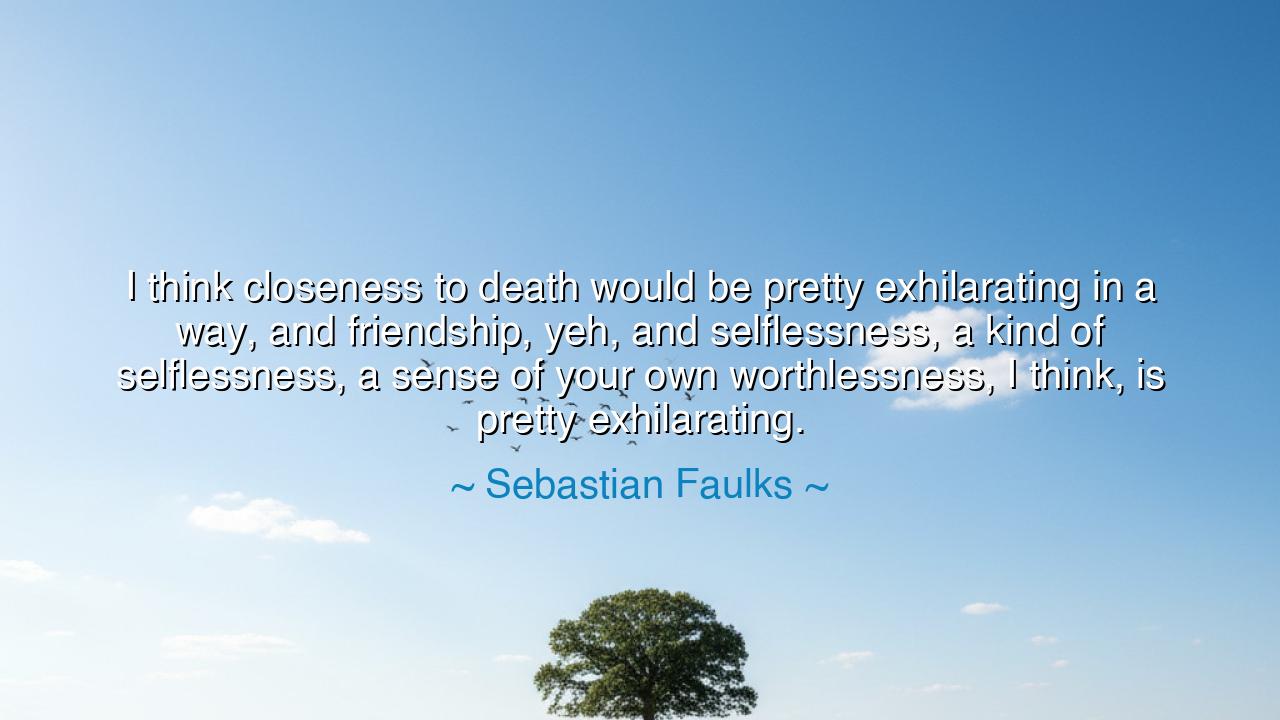
I think closeness to death would be pretty exhilarating in a way
I think closeness to death would be pretty exhilarating in a way, and friendship, yeh, and selflessness, a kind of selflessness, a sense of your own worthlessness, I think, is pretty exhilarating.






“I think closeness to death would be pretty exhilarating in a way, and friendship, yeh, and selflessness, a kind of selflessness, a sense of your own worthlessness, I think, is pretty exhilarating.” Thus spoke Sebastian Faulks, the chronicler of war and the human soul, whose novels carry the echo of soldiers’ hearts and the trembling wisdom of mortality. In these words, he unveils a paradox both unsettling and profound: that exhilaration—that electric sense of being truly alive—can be found not in triumph or pleasure, but in standing near the edge of life itself, in friendship, and in selflessness. For when the illusion of permanence is stripped away, what remains is truth: the soul laid bare, humble, yet free.
Faulks’s words are born from his lifelong meditation on war and human fragility. His stories, such as Birdsong, draw from the trenches of the Great War, where young men stood face to face with death, and in that confrontation discovered a strange intensity of life. In those dark tunnels beneath the earth, they found not despair alone, but moments of unearthly clarity—a love for one another deeper than brotherhood, a friendship untainted by pretense, a selflessness that lifted them above fear. For when death stands near, vanity and ambition fall silent, and what remains is the pure pulse of existence, beating not for the self, but for others.
To be close to death, Faulks suggests, is not merely to face terror, but to awaken to wonder. Mortality humbles the spirit. It strips away the noise of ego, the endless craving for recognition, and reveals how small—yet how precious—our lives truly are. This “sense of your own worthlessness,” as he calls it, is not despair, but liberation. It is the realization that one’s individual importance fades before the vastness of time, and yet, within that humility, there is peace. When we cease to cling to the self, we make room for awe—for the infinite, for compassion, for the unspoken beauty of the fleeting moment.
In ancient times, the Stoics taught that to contemplate death was not to surrender, but to learn how to live. Marcus Aurelius, emperor and philosopher, wrote that every day should be lived as though it were the last, not in recklessness, but in gratitude. For only by facing mortality can a person see what truly matters. So too did the warriors of old—Spartans, Samurai, knights of the cross—train themselves to meet death without fear, finding in that acceptance a serenity that ordinary men could not grasp. Their courage was born not from pride, but from selflessness, from knowing that life’s meaning lies not in the length of its days, but in the depth of its purpose.
Faulks ties this ancient wisdom to the modern soul. In his reflection, friendship stands beside death as a companion in clarity. For friendship, too, demands the abandonment of the self. It calls one to give without tally, to trust without condition, to see in another’s joy the reflection of one’s own. In true friendship, the barriers of ego crumble, and two hearts breathe as one. Thus, the exhilaration Faulks describes arises not from dominance, but from surrender—from losing oneself in the vast current of shared humanity.
Consider the story of Ernest Shackleton, whose Antarctic expedition met disaster when his ship was trapped in the ice. Surrounded by cold, hunger, and despair, he could have yielded to hopelessness. Yet it was selflessness and friendship that carried his men through. Shackleton placed their survival above his own ambition. They faced death daily, yet in that peril found an unbreakable unity, a fierce joy in endurance together. It was as Faulks described: in the shadow of death, they became more alive than they had ever been before.
From this, a lesson gleams like steel drawn from the forge: seek not exhilaration in excess or comfort, but in clarity of being. Draw near to life’s edge, not in recklessness, but in awareness. Remember death—not morbidly, but mindfully—for it reminds you to live. Practice selflessness daily: listen more deeply, serve without reward, and measure your worth not by what you gain, but by what you give. Cherish friendship as a sacred fire—tend it with care, for it is through others that we find the reflection of the divine within ourselves.
In the end, Faulks’s wisdom is not dark but luminous. He teaches that to face death and to feel one’s smallness is not to despair, but to awaken—to be flooded with the wonder of simply being, of loving, of sharing a moment beneath the vast sky. When we relinquish the self, when we accept our fragility, we become like those who walk close to eternity: humble, compassionate, and profoundly alive. For in the fleeting breath between life and death, between self and surrender, lies the greatest exhilaration of all—the truth of what it means to be human.






AAdministratorAdministrator
Welcome, honored guests. Please leave a comment, we will respond soon